C. Lee McKenzie's Blog, page 95
December 19, 2010
My Last Post in 2010
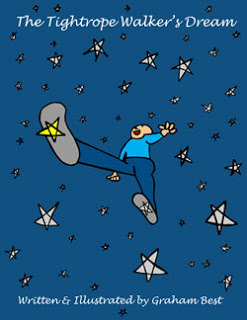 First and most important is that Graham Best has generously sent me copies of his wonderfully illustrated and beautifully written book,
The Tightrope Walker's Dream
.
First and most important is that Graham Best has generously sent me copies of his wonderfully illustrated and beautifully written book,
The Tightrope Walker's Dream
. I featured his book earlier this year, but because it's Christmas I wanted to offer another visitor a chance to win Graham's book. It probably won't come in time for Christmas, but you can start your new year by winning and enjoying his story.
Just leave a comment about what dream has turned into reality after you let your heart lead the way.
Merry Christmas all. I look forward to seeing you here and at your own special places in the blogosphere in 2011.
C. Lee
Sliding on the Edge, C. Lee McKenzie, WestSide Books, Spring '09
Published on December 19, 2010 09:39
December 13, 2010
Christmas Catch Up
[image error]
Hope all of you are having a wonderful holiday season. First I have to give a gift today and that should put me into the holiday spirit! Natasha, the judges said your story won, so you'll be receiving the signed copy of Shooting Kabul. Congratulations. Contact me and send me your snail mail address.
Now that that's done. Let's think about what the season is really about. Gifts, of course, but the idea behind those gifts. The wrapping up at the end of the year, looking back to be grateful, looking ahead to the possibilities in the new year.
What are you looking back to in 2010? What are you looking forward to in 2011? Hopes? Dreams? Good health? Knitting together rifts or reaching out to new friends?
I'm remembering 2010 as a great year. My mom is still with me, even though she's had some illnesses that were deeply troubling. My family survived the economic downturn. My yoga brought me closer to my goal of being"accepting" instead of "judgmental." I have book two out as of the fifteenth.
As for 2011, I'm looking forward to a wonderful year of writing--submitting my third book, developing my fourth, sharing with writers whenever possible and keeping close ties with my friends and family.
Oh, yes and lots of persimmon things. My neighbor's tree was prolific this year and I have a freezer full of persimmon pulp just waiting to go into cookies and puddings. Having persimmons ensures that I will have a lot of guests. I think they smell when I'm baking and just happen to drop by! Lovely.

Sliding on the Edge, C. Lee McKenzie, WestSide Books, Spring '09
Now that that's done. Let's think about what the season is really about. Gifts, of course, but the idea behind those gifts. The wrapping up at the end of the year, looking back to be grateful, looking ahead to the possibilities in the new year.
What are you looking back to in 2010? What are you looking forward to in 2011? Hopes? Dreams? Good health? Knitting together rifts or reaching out to new friends?
I'm remembering 2010 as a great year. My mom is still with me, even though she's had some illnesses that were deeply troubling. My family survived the economic downturn. My yoga brought me closer to my goal of being"accepting" instead of "judgmental." I have book two out as of the fifteenth.
As for 2011, I'm looking forward to a wonderful year of writing--submitting my third book, developing my fourth, sharing with writers whenever possible and keeping close ties with my friends and family.
Oh, yes and lots of persimmon things. My neighbor's tree was prolific this year and I have a freezer full of persimmon pulp just waiting to go into cookies and puddings. Having persimmons ensures that I will have a lot of guests. I think they smell when I'm baking and just happen to drop by! Lovely.

Sliding on the Edge, C. Lee McKenzie, WestSide Books, Spring '09
Published on December 13, 2010 10:30
December 6, 2010
Giving Gifts to Writers
 InkSpells (Susan Kaye Quinn) and Catherine Stein at her Idea City have come up with some super gift ideas for writers at Christmas. I'm very partial to these: The Chocolate Keyboard and the Telephone Book Dress--recycling at its best.
InkSpells (Susan Kaye Quinn) and Catherine Stein at her Idea City have come up with some super gift ideas for writers at Christmas. I'm very partial to these: The Chocolate Keyboard and the Telephone Book Dress--recycling at its best. The gift of time ain't bad either. Someone suggested writers could use more of that than anything. If you have some please don't hesitate to wrap it up for me.
The gift of time ain't bad either. Someone suggested writers could use more of that than anything. If you have some please don't hesitate to wrap it up for me. What I'd like to give is a gift of books this season. My family already has theirs under the tree, but I'm also giving some away here to my readers and good friends who write. So, if you want a book in time for Christmas all you have to do is tell me story. I love those that are heartwarming, have a sweet surprise, or make me laugh, so any of these would win a prize.
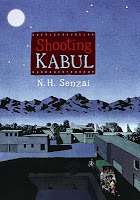 This week's book is a signed copy of Shooting Kabul. It's a wonderful story with all the characteristics I've listed above. Here are the rules :-) Gots to have rules!
This week's book is a signed copy of Shooting Kabul. It's a wonderful story with all the characteristics I've listed above. Here are the rules :-) Gots to have rules!1) In your comment tell me a story with at least one of those great in 100 words or less.
2) Tell the world you just wrote the prize-winning story by TWEETING it or writing a NOTE on FACEBOOK and tagging 10 friends. (Include me in your tags, okay?)
3) Be sure to leave me your email just in case you win and I'll send the book off by Dec. 13th.
I'm looking forward to your stories.Sliding on the Edge, C. Lee McKenzie, WestSide Books, Spring '09
Published on December 06, 2010 10:41
November 30, 2010
Literary Dialect
In my last post before I took a break, I wrote about Literary Dialect and gave some examples of how a writer can capture in print the way a character sounds. I stopped before I got into the issue of "respelling."
You know, gonna instead of "going to," hafta instead of "have to." This technique has stirred some controversy among linguists as well as writers, so I thought it would be interesting to present the opposing views here, and then ask for your opinions.
 Dr. Dennis Preston, distinguished professor of linguistics at MSU has presented strong objections to respelling. He's even given it a special name--Eye Dialect--referring to how the prose looks on the page Here's why he objects to using it.
Dr. Dennis Preston, distinguished professor of linguistics at MSU has presented strong objections to respelling. He's even given it a special name--Eye Dialect--referring to how the prose looks on the page Here's why he objects to using it.
All speakers of English reduce vowels and cluster words in normal conversation. How many people, including yourself, say, "I have to go now."? If I wrote what I'd hear it would look like this. "I hafta go now." So if you single out one group to misspell or mark as different, Dr. Preston believes you are devaluing that dialect.
He also says that writing dialect phonetically may distract readers, so they pay more attention to how something's being said than what's being said. He gives an excerpt from Uncle Tom's Cabin as an example:
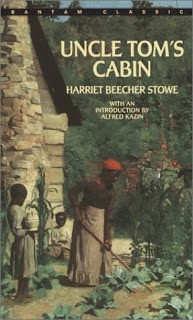
"But, Aunt Chloe, I'm getting mighty hungry," said George. "Isn't that cake in the skillet almost done?" "Mose done, Mas'r George," said Aunt Chloe, lifting the lid and peeping in, -- "browning beautiful -- a real lovely brown. Ah! let me alone for dat. Missis let Sally try to make some cake, t' other day, jes to larn her, she said. 'O, go way, Missis,' said I; 'it really hurts my feelin's, now, to see good vittles spilt dat ar way! Cake ris all to one side -- no shape at all; no more than my shoe; go way!"
Harriet Beecher Stow didn't set out to devalue the black dialect, but Dr. Preston believes that even though this devaluing is unintentional it is inappropriate. In her blog Anne Sibley O'Brien writes,
"Being a dominant group member is like having a free pass that members of out-groups don't have, but with no awareness of having it. Given such conditioning, developing White Mind is pretty much inescapable."
So she and Dr. Preston say that respelling one group's language may reveal more about authors and their assumptions/biases than about the characters they're creating.
In contrast the Folklorist, Dr. Elizabeth Fine says this is an expression of appreciation for the characters and their dialects. The author is using an effective way of letting the reader "hear" the voice. Eye dialect translates performance (how a character sounds) into print.
When you read Eye Dialect, what is your reaction? Is it distracting or does it help you "hear" the characters' voices? If you're a writer, do you use Eye Dialect? How much? I'd love to hear from you and find out what you think about this technique.
Sliding on the Edge, C. Lee McKenzie, WestSide Books, Spring '09
You know, gonna instead of "going to," hafta instead of "have to." This technique has stirred some controversy among linguists as well as writers, so I thought it would be interesting to present the opposing views here, and then ask for your opinions.
 Dr. Dennis Preston, distinguished professor of linguistics at MSU has presented strong objections to respelling. He's even given it a special name--Eye Dialect--referring to how the prose looks on the page Here's why he objects to using it.
Dr. Dennis Preston, distinguished professor of linguistics at MSU has presented strong objections to respelling. He's even given it a special name--Eye Dialect--referring to how the prose looks on the page Here's why he objects to using it.All speakers of English reduce vowels and cluster words in normal conversation. How many people, including yourself, say, "I have to go now."? If I wrote what I'd hear it would look like this. "I hafta go now." So if you single out one group to misspell or mark as different, Dr. Preston believes you are devaluing that dialect.
He also says that writing dialect phonetically may distract readers, so they pay more attention to how something's being said than what's being said. He gives an excerpt from Uncle Tom's Cabin as an example:

"But, Aunt Chloe, I'm getting mighty hungry," said George. "Isn't that cake in the skillet almost done?" "Mose done, Mas'r George," said Aunt Chloe, lifting the lid and peeping in, -- "browning beautiful -- a real lovely brown. Ah! let me alone for dat. Missis let Sally try to make some cake, t' other day, jes to larn her, she said. 'O, go way, Missis,' said I; 'it really hurts my feelin's, now, to see good vittles spilt dat ar way! Cake ris all to one side -- no shape at all; no more than my shoe; go way!"
Harriet Beecher Stow didn't set out to devalue the black dialect, but Dr. Preston believes that even though this devaluing is unintentional it is inappropriate. In her blog Anne Sibley O'Brien writes,
"Being a dominant group member is like having a free pass that members of out-groups don't have, but with no awareness of having it. Given such conditioning, developing White Mind is pretty much inescapable."
So she and Dr. Preston say that respelling one group's language may reveal more about authors and their assumptions/biases than about the characters they're creating.
In contrast the Folklorist, Dr. Elizabeth Fine says this is an expression of appreciation for the characters and their dialects. The author is using an effective way of letting the reader "hear" the voice. Eye dialect translates performance (how a character sounds) into print.
When you read Eye Dialect, what is your reaction? Is it distracting or does it help you "hear" the characters' voices? If you're a writer, do you use Eye Dialect? How much? I'd love to hear from you and find out what you think about this technique.
Sliding on the Edge, C. Lee McKenzie, WestSide Books, Spring '09
Published on November 30, 2010 16:32
November 13, 2010
NCTE and Me
I'll be taking a break from the Write Game from Nov. 13th to Dec. 2nd. This will give me time to do a presentation at NCTE in Orlando on Nov. 19th, and then stuff a turkey for the following Thursday. Why does everything happen at the same time?
I thought that since most of my readers are writers I'd give you a bit of preview of the presentation.
The title is Why Ain't and Gotta Gotta be in Today's Books for Kids and Teens and I'll be chairing the session which will include:
 Cheryl Herbsman (
Breathing
)
Cheryl Herbsman (
Breathing
)
 Erin Dionne (Models Don't Eat Chocolate &
Erin Dionne (Models Don't Eat Chocolate &
 Cynthea Liu ( Paris Pan Takes the Dare & The Great Call of China)
Cynthea Liu ( Paris Pan Takes the Dare & The Great Call of China)
 Kurtis Scaletta (Mudville &
Mamba Point
)
Kurtis Scaletta (Mudville &
Mamba Point
)
 Carrie Ryan (Forest of Hands and Teeth &
Dead Tossed Waves
).
Carrie Ryan (Forest of Hands and Teeth &
Dead Tossed Waves
).
Am I in good company or what?
I took on the job of chair because of my background in linguistics, so I'll be establishing the framework for this session about Literary Dialect.
So what is literary dialect anyway? It's a way of speaking that marks regional, cultural, ethnic and social differences among characters in your books. In other words: accent, word choice, and grammatical usage. And there are many ways to approach capturing performance and putting it on paper.
In my latest WIP I wanted to characterize a character from Texas, but I didn't want to clutter the page with the typical y'alls, so I used standard spelling, but in the attribute I described the character's speech. Since this book will be in first person pov, it will be the protagonist who comments on the Texas accent. Here's one example:
Texas character."So what do you say?" POV character. Dad's question comes out in slow Texan.
I like this technique because readers can hear whatever Texas accent they want.
In Sliding on the Edge I had a non-native speaking Vietnamese character and to capture his voice I omitted unstressed words that a native speaker of English would never omit. "The" is often barely noticed, but since it's a morpheme (a unit in our language that carries meaning) if it's missing we know. I chose to omit the for another reason as well. "th" is a rare sound in the languages of the world and often difficult for second language learners to articulate. Here's how Tuan sounds in my story.
"Las Vegas!" He spits into the gutter. "Hoodlums do this. All time."
In The Princess of Las Pulgas I have a feisty character, named K.T., with attitude as her middle name. Here she is giving my poor MC a dose of that attitude.
"There you go again, thinking I'm stupid. I heard all that scratchin' your pencil did and I seen those pages full of writing."
K.T. isn't stupid, but she likes to break as many rules as possible, including grammar. Here she mangles standard English by using the past participle, seen, instead of the simple past, saw. It doesn't make the meaning unclear, but characterizes her perfectly.
If you noticed, the word, scratchin', is respelled and that will be the technique I'll go into more at the conference. When I start blogging again in December I'll go into it here as well. It's an interesting technique that's often used, but it's controversial among linguists as well as writers. So come back in Dec. and I'll share what I know about respelling.

Well, that's enough. Happy Thanksgiving. Come back to visit when you're full of good food and holiday memories. I look forward to your visit.Sliding on the Edge, C. Lee McKenzie, WestSide Books, Spring '09
I thought that since most of my readers are writers I'd give you a bit of preview of the presentation.
The title is Why Ain't and Gotta Gotta be in Today's Books for Kids and Teens and I'll be chairing the session which will include:
 Cheryl Herbsman (
Breathing
)
Cheryl Herbsman (
Breathing
) Erin Dionne (Models Don't Eat Chocolate &
Erin Dionne (Models Don't Eat Chocolate &  Cynthea Liu ( Paris Pan Takes the Dare & The Great Call of China)
Cynthea Liu ( Paris Pan Takes the Dare & The Great Call of China)  Kurtis Scaletta (Mudville &
Mamba Point
)
Kurtis Scaletta (Mudville &
Mamba Point
) Carrie Ryan (Forest of Hands and Teeth &
Dead Tossed Waves
).
Carrie Ryan (Forest of Hands and Teeth &
Dead Tossed Waves
). Am I in good company or what?
I took on the job of chair because of my background in linguistics, so I'll be establishing the framework for this session about Literary Dialect.
So what is literary dialect anyway? It's a way of speaking that marks regional, cultural, ethnic and social differences among characters in your books. In other words: accent, word choice, and grammatical usage. And there are many ways to approach capturing performance and putting it on paper.
In my latest WIP I wanted to characterize a character from Texas, but I didn't want to clutter the page with the typical y'alls, so I used standard spelling, but in the attribute I described the character's speech. Since this book will be in first person pov, it will be the protagonist who comments on the Texas accent. Here's one example:
Texas character."So what do you say?" POV character. Dad's question comes out in slow Texan.
I like this technique because readers can hear whatever Texas accent they want.
In Sliding on the Edge I had a non-native speaking Vietnamese character and to capture his voice I omitted unstressed words that a native speaker of English would never omit. "The" is often barely noticed, but since it's a morpheme (a unit in our language that carries meaning) if it's missing we know. I chose to omit the for another reason as well. "th" is a rare sound in the languages of the world and often difficult for second language learners to articulate. Here's how Tuan sounds in my story.
"Las Vegas!" He spits into the gutter. "Hoodlums do this. All time."
In The Princess of Las Pulgas I have a feisty character, named K.T., with attitude as her middle name. Here she is giving my poor MC a dose of that attitude.
"There you go again, thinking I'm stupid. I heard all that scratchin' your pencil did and I seen those pages full of writing."
K.T. isn't stupid, but she likes to break as many rules as possible, including grammar. Here she mangles standard English by using the past participle, seen, instead of the simple past, saw. It doesn't make the meaning unclear, but characterizes her perfectly.
If you noticed, the word, scratchin', is respelled and that will be the technique I'll go into more at the conference. When I start blogging again in December I'll go into it here as well. It's an interesting technique that's often used, but it's controversial among linguists as well as writers. So come back in Dec. and I'll share what I know about respelling.

Well, that's enough. Happy Thanksgiving. Come back to visit when you're full of good food and holiday memories. I look forward to your visit.Sliding on the Edge, C. Lee McKenzie, WestSide Books, Spring '09
Published on November 13, 2010 09:35
November 10, 2010
YaLitChat
 I'm a member and moderator at YaLitChat. If you haven't heard of us take a look because within one year (as of last Tuesday) we have over 1800 members. Many are published, many are seeking publication, but all are there to support and learn and produce the best writing for YA and MG readers as they can.
I'm a member and moderator at YaLitChat. If you haven't heard of us take a look because within one year (as of last Tuesday) we have over 1800 members. Many are published, many are seeking publication, but all are there to support and learn and produce the best writing for YA and MG readers as they can.For the month of November we're hosting a great contest for writers who have taken on the NaNoWriMo challenge. If you're a YaLitChat member you can enter to win:
*A KINDLE
*A 20 page critique by a leading industry Agent or Editor (We have wonderful agents/editors who have joined our YAlitchat family)
*A bookpack of Rampant by Diana Peterfreund plus 2 books from Harper
CONTEST DETAIL:
"The winner meets their 50K goal or has the highest count of all contestants. As well as posting a snippet of writing daily (25 words of your writing for the day) and the word count for the day that you post. The winner would have posted at least 10 times during the month of November their word count and snippet for that day. Please provide your nanowrimo.org screen name and buddy all of the contestants." YaLitChat Forum
To enter:
- JoinYalitchat
- Join Contest Forum
- Post Introduction to include (nanowrimo login name, title of nanowork, current words completed, 5 sentence synopsis of book you are writing)
- Post Daily or weekly (word count, 25 word snippet of what your wrote during the recent session)
- Win if yours is the highest recorded word count of all contestants. You may need to present a draft to prove your word count.)
Is there any reason you wouldn't want to enter? Sliding on the Edge, C. Lee McKenzie, WestSide Books, Spring '09
Published on November 10, 2010 16:33
November 3, 2010
Job Opening-Description Follows
The holidays are officially launched. Halloween is the harbinger of Thanksgiving which means, unless you're Macy's, Christmas will come in another month. This is the time of year I'm most likely to panic. It's also the time I grow nostalgic. Anyone with me here?
What I need most is a touch of humor to get me though November and December. So here's my humble attempt at making myself laugh. It's "groundling"humor, but I love it. And I hope you'll laugh a bit along with me.
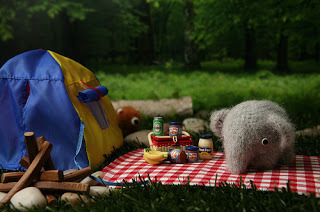
Job Description: Long-term worker needed for challenging, permanent work in chaotic environment. Applicants must possess excellent communication and organizational skills and be willing to work evenings and weekends and frequent 24-hour shifts. There is some overnight travel required, including trips to primitive camping sites on rainy weekends and endless sports tournaments in faraway cities. Travel expenses are not reimbursed.
Responsibilities:
Must keep this job for the rest of your life. Must be willing to be hated, at least temporarily. Must be willing to bite tongue repeatedly. Must possess the physical stamina of a pack mule. Must be willing to tackle stimulating technical challenges such as small gadget repair, sluggish toilets, and stuck zippers. Must handle assembly and product safety testing, as well as floor maintenance and other janitorial work. Must screen phone calls, maintain calendars and coordinate production of multiple homework projects. Must have ability to plan and organize social gatherings for clients of all ages and levels of mentality. Must be willing to be indispensable one minute and an embarrassment the next. Must assume final, complete accountability for the quality of the end product.
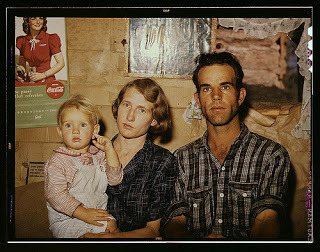 Advancement and Promotion:
Advancement and Promotion:
There is no possibility of either. Your job is to remain in the same position for years, without complaining constantly retraining and updating your skills so that those in your charge can ultimately surpass you.
Previous Experience:
None required, but on-the-job training is offered on a continually exhausting basis.
Wages:
Are you kidding? In fact, you must pay those in your charge, offering frequent raises and bonuses. A balloon payment is due when they turn 18 and attend college. When you die you give them whatever income you have left.
Benefits:
*Laughing here.* There is no health or dental insurance, no pension, no tuition reimbursement, no paid holidays and no stock options. However the job offers limitless opportunities for personal growth and free hugs for life.
 So if you haven't already taken on this challenging occupation, are you interested? Consult your nearest parent before applying.
So if you haven't already taken on this challenging occupation, are you interested? Consult your nearest parent before applying.
Sliding on the Edge, C. Lee McKenzie, WestSide Books, Spring '09
What I need most is a touch of humor to get me though November and December. So here's my humble attempt at making myself laugh. It's "groundling"humor, but I love it. And I hope you'll laugh a bit along with me.

Job Description: Long-term worker needed for challenging, permanent work in chaotic environment. Applicants must possess excellent communication and organizational skills and be willing to work evenings and weekends and frequent 24-hour shifts. There is some overnight travel required, including trips to primitive camping sites on rainy weekends and endless sports tournaments in faraway cities. Travel expenses are not reimbursed.
Responsibilities:
Must keep this job for the rest of your life. Must be willing to be hated, at least temporarily. Must be willing to bite tongue repeatedly. Must possess the physical stamina of a pack mule. Must be willing to tackle stimulating technical challenges such as small gadget repair, sluggish toilets, and stuck zippers. Must handle assembly and product safety testing, as well as floor maintenance and other janitorial work. Must screen phone calls, maintain calendars and coordinate production of multiple homework projects. Must have ability to plan and organize social gatherings for clients of all ages and levels of mentality. Must be willing to be indispensable one minute and an embarrassment the next. Must assume final, complete accountability for the quality of the end product.
 Advancement and Promotion:
Advancement and Promotion: There is no possibility of either. Your job is to remain in the same position for years, without complaining constantly retraining and updating your skills so that those in your charge can ultimately surpass you.
Previous Experience:
None required, but on-the-job training is offered on a continually exhausting basis.
Wages:
Are you kidding? In fact, you must pay those in your charge, offering frequent raises and bonuses. A balloon payment is due when they turn 18 and attend college. When you die you give them whatever income you have left.
Benefits:
*Laughing here.* There is no health or dental insurance, no pension, no tuition reimbursement, no paid holidays and no stock options. However the job offers limitless opportunities for personal growth and free hugs for life.
 So if you haven't already taken on this challenging occupation, are you interested? Consult your nearest parent before applying.
So if you haven't already taken on this challenging occupation, are you interested? Consult your nearest parent before applying. Sliding on the Edge, C. Lee McKenzie, WestSide Books, Spring '09
Published on November 03, 2010 22:14
October 28, 2010
Happy Ghostly Halloween
 It's the time of year to pull those pumpkin vines, bundle the corn stalks and put away the outdoor furniture. Fall is for coming to the hearth with a good book and a hot cup of cocoa-a time to look inward and reminisce about spring and summer days that warmed the garden and brought forth the crops for harvest.
It's the time of year to pull those pumpkin vines, bundle the corn stalks and put away the outdoor furniture. Fall is for coming to the hearth with a good book and a hot cup of cocoa-a time to look inward and reminisce about spring and summer days that warmed the garden and brought forth the crops for harvest. The sudden shift of light, the clouds with hints of a storm bundled inside, the night that comes more quickly . . . all of these are October, and there's a slight charge in the air as the old myths stir within our memory.
Persephone once again returns to Hades as she was bound to do. Demeter bemoans the loss of her daughter and the earth goes silent and infertile for the months they are separated.
Now is the time for ghosts to walk among us, while our minds grow quiet in the long chilled nights.
I haven't written a ghost story in a few years, but I had a couple published a while ago in Crow Toes Quarterly, so I thought to celebrate the season, I'd share this one. It's written for middle grade readers, so I hope you'll print it and read it or give it to a young reader who would like to be a tad scared by the THE GHOSTLY DOUBLE.

photo by sgrunt
Sliding on the Edge, C. Lee McKenzie, WestSide Books, Spring '09
Published on October 28, 2010 08:50
October 21, 2010
A Visit from Beth Fehlbaum
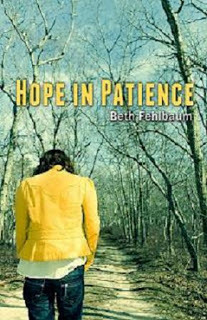
I'm so excited to have a fellow WestSide author, BETH FEHLBAUM visit me this week. Here are some of the things Beth has to say about her books, HOPE IN PATIENCE and COURAGE IN PATIENCE. She tells us a bit about herself and shares some advice for writers. Welcome, Beth.
What triggered the idea for your books, Hope in Patience and Courage in Patience?
I had been in therapy for a little over a year. I was sexually abused from the age of 8 to 15 and emotionally abused much longer than that. I was writing stories and poems as a way of processing my grief, disbelief, and rage, and sharing them with my therapist. One day, he suggested that I try writing a novel. I tried for about four months but I kept ending up in the same place of trying to figure out why I had been abused and why my mom turned her back on me when I asked for help as a teen, and again when I told her I was struggling with what happened in my childhood.
One day I realized that I was getting nowhere and decided to try telling a story of recovery from the point of view of a 15 year old girl who was a recent transplant to the Piney Woods of East Texas. That's how Ashley Nicole Asher, age 15, and the tiny East Texas town of Patience came to be.
In my own life, I longed for a father since I had never really known my biological father, and my stepfather was my perpetrator, so I gave Ashley a very strong father figure in David.
I guess you could say that what triggered the Patience series was my own longing to understand and move past my own pain.
Is there a favorite line or two from either of your books that you'd like to share with us?
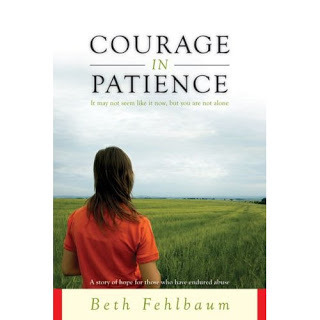 The sentence that serves as the preface for Courage in Patience is, "Courage is not so much avoiding danger but is conquering it." And the sentence that prefaces Hope in Patience is, "Hope is the opposite of fear." Both of those are credited to "A wise person"—and that wise person is my (now-former) therapist.
The sentence that serves as the preface for Courage in Patience is, "Courage is not so much avoiding danger but is conquering it." And the sentence that prefaces Hope in Patience is, "Hope is the opposite of fear." Both of those are credited to "A wise person"—and that wise person is my (now-former) therapist. Are you working on another book? Can you give us a sneak preview?
I am working on Truth in Patience, the third and probably last book in the Patience series. It opens with Ashley making out with her boyfriend, Joshua, who we meet in Hope in Patience—and she's struggling with something that's very common to survivors of sexual abuse—the desire to be close to someone she loves, conflicting with this screaming, freaking out inner voice that is basically setting off sirens in her head because it's so, so difficult to be physically close with someone when the only "version" of that the victim has previously had was in the context of molestation or rape. I'm about four chapters in so far, and I plan on finishing the first draft the summer of 2011.
What's been the most exciting/daunting part of becoming a published author?
It's very exciting to be nominated for an award: Hope in Patience was nominated for a 2011 YALSA Quick Pick for Reluctant Readers. It's exciting to be a more public person, and also somewhat daunting. I'm starting to be asked to speak at things like luncheons and crime victim support group meetings, and that's both exciting and a little nerve-wracking. One thing I've learned from my life experiences is to compare things that make me nervous to the worst things that I've ever been through. It really helps put it in perspective! Even though it's not always easy for me to "come out" as a survivor of childhood sexual abuse, I really want people to know that there is hope for recovery. It's a very hard road to travel, but it can be done.
Is there anything you can share with hopeful writers that might help them-- something about writing or seeking representation or preparing for publication.
I would encourage them to "just write." Write for the joy that it brings you or the feeling it gives you inside, and write the very best manuscript you can for yourself…THEN worry about finding an agent and selling your work. Believe in yourself and never give up.
As far as preparing for publication, it's a lot of hard work. Publicists are great, and I do have one for the launch of Hope in Patience, but writers need to be aware that to get your book "out there", it takes an enormous amount of self-promotion. If you just sit back and wait for your books to become known, it probably won't happen.
I invite readers to stop by my WEBSITE, and check out Chapter previews for both Hope in Patience and Courage in Patience!
 Sliding on the Edge, C. Lee McKenzie, WestSide Books, Spring '09
Sliding on the Edge, C. Lee McKenzie, WestSide Books, Spring '09
Published on October 21, 2010 13:13
October 18, 2010
Some Drac Facts
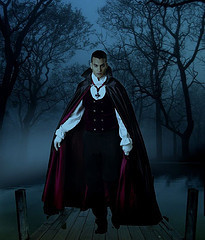
He look pretty suave to me.
I hadn't read Dracula in a long while, so I checked out a copy of the latest edition and found a fascinating introduction by Joan Acocella (American journalist and dance critic for the New Yorker.) She shared so many interesting facts that I'd either forgotten or never heard of, and, since they heightened my appreciation of this iconic novel, I thought I'd share some with you to celebrate this dark season.
First, as you probably know the lovely idea of the living dead wasn't orignial with Bram Stoker. These creatures had been around in European folklore for a long time before Stoker created the sensual count and captured the imagination of the reading public. "Captured the imagination" is another way of saying "lured them with the forbidden."
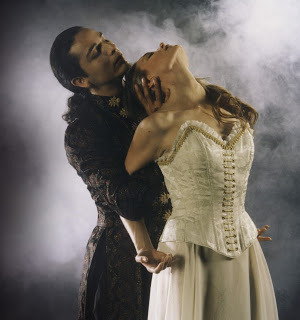
"I love those taboos," and so say all of us.
The idea of the suave, enticing male figure didn't originate with Stoker. It was Lord Byron's personal physician, John Pilidori, who wrote The Vampyre: A Tale and published it in 1819. He might even have crafted his undead character after the handsome Byron himself and used an outline of a story Bryon had started. By all accounts, The Vampyre was an erotic tale, luring readers with innocent virgins and an irresistible fiend. Wowzer! No wonder it was a hit. Remember, in last week's post I suggested writers could keep readers hooked by exploring taboos; the good doctor must have known that.
Here's something I had never read before. Mary Gowin was a guest of Lord Byron's good friend and neighbor, Percy Bysshe Shelley, during a summer stay at Lake Geneva. As a game several of the guests wrote or started to write ghost stories. While Polidore worked on his Vampyre story, eighteen-year-old Gowin began writing Frankenstein. This was in 1816. I would say that there were some significant ghostly vibes around that Swiss lake that year.
There have been more than 150 movies made about Dracula. The first one was a silent film titled Nosferatu and came out in 1922.
 Bella Lugosi began playing Count Dracula on stage in 1927 and became the count on screen for most of his career. It wasn't what he wanted, but in the end it made him famous. Ms. Acocella writes, "[Lugosi] was buried in his Dracula cloak."
Bella Lugosi began playing Count Dracula on stage in 1927 and became the count on screen for most of his career. It wasn't what he wanted, but in the end it made him famous. Ms. Acocella writes, "[Lugosi] was buried in his Dracula cloak."Bram Stoker was born outside of Dublin in 1847. He was very ill and bedridden until he was seven, and mentioned how that time alone, turned him into an introspective person whose thoughts during those early years became books in his later ones.
About 1871 he turned to acting, but didn't do very well. Next he became a drama critic (sounds like revenge to me) and started to write short stories. His first novel, The Snake's Pass was published in in1890. He publishes Dracula in 1897.
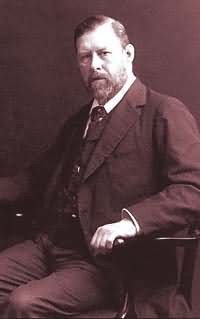
Bram Stoker
So what other facts are there about our famous writer and his famous book, Dracula? Can you share them here? Thanks.Sliding on the Edge, C. Lee McKenzie, WestSide Books, Spring '09
Published on October 18, 2010 09:03



